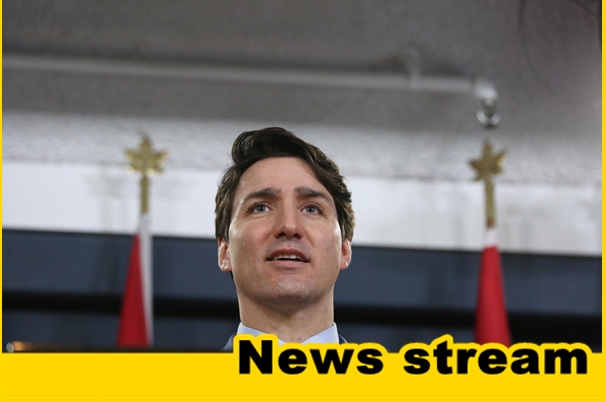
Russian interference in the 2016 U.S. presidential election rattled America’s next-door neighbor so badly that Canada spent the last three years developing the most detailed plan anywhere in the Western world to combat foreign meddling in its upcoming election.
But with the country’s national campaign to begin in a matter of weeks, one question remains: Will the efforts pay off?
Prime Minister Justin Trudeau’s government passed new transparency rules last year for online political ads that run on platforms including Facebook and Twitter — further than what’s required in the U.S. It ordered the country’s usually tight-lipped intelligence services to go public about foreign threats. Canada also housed a G-7 project to share the latest intelligence between allies about possible foreign disinformation and created a non-partisan group to warn political parties and the public about outside interference.
“The way the Canadians have responded to the problem of technology and democracy is much more impressive than what we’ve seen in Washington,” said Ben Scott, a former Hillary Clinton official, now based in Toronto, who has tracked disinformation campaigns in elections across the West. “Pound for pound, Canada is way ahead of the U.S. in terms of policy development on these issues.”
The country finds itself on the front lines of a global battle to tackle foreign election interference on social media, other platforms for political advertising and hacking of political databases — and lessons from its upcoming nationwide vote will prove essential for U.S. policymakers already fearful that next year’s presidential campaign will see another round of digital tricks aimed at swaying potential voters and underlying democratic institutions.
“We saw very clearly that countries like Russia are behind a lot of the divisive campaigns, a lot of the divisive social media that have turned our politics even more divisive and more anger-filled than they have been in the past,” Trudeau told reporters earlier this year.
To prepare, Canadian officials visited counterparts in the U.S. and across Europe, where elections ranging from last year’s U.S. midterms to the European Parliament elections in May have been rife with disinformation around hot-button topics like race and migration as well as potential cyber threats from hostile governments.
“If even the United States is vulnerable, everyone is,” said Jean-Baptiste Jeangène Vilmer, a French government official who advised Canada on its election strategy.
The upcoming campaign — the head of whichever party wins the most seats in Canada’s 338-member Parliament on Oct. 21 will be named prime minister — will be hard fought. While Trudeau was once seen as primed for another term, he is now locked in a tight race with Andrew Scheer, leader of the rival Conservative Party, in an election where ongoing tensions with global autocrats has left Canada, often known as a benign boy scout, ripe for foreign interference.
Russia, for instance, banned Canadian Foreign Minister Chrystia Freeland because of her support for sanctions and targeted her in an online smear campaign. Saudi Arabia became angry after Freeland promoted human rights in the Middle Eastern country. China also arrested Canadians and blocked imports of Canadian canola and meat following the arrest of senior Huawei executive Meng Wanzhou on a U.S. extradition request.
Very alarmed to learn that Samar Badawi, Raif Badawi’s sister, has been imprisoned in Saudi Arabia. Canada stands together with the Badawi family in this difficult time, and we continue to strongly call for the release of both Raif and Samar Badawi.
— Chrystia Freeland (@cafreeland) August 2, 2018
But with many of Canada’s new tactics yet to be tested by real-world attacks, some lawmakers and officials are skeptical the country can successfully fend off online disinformation, cyberattacks and other foreign interference.
Some of Trudeau’s homegrown critics point out that his government has focused on Russian meddling while overlooking how Canadian progressive groups that received U.S. funding promoted his own campaign in 2015. Others question the government’s focus on overseas actors when much of the recent activity has come from domestic groups also trying to sway voters through underhanded tactics.
“If we’re in the lead, that’s concerning because we have a long way to go,” said Bob Zimmer, a politician with Canada’s opposition Conservatives, who chairs a parliamentary committee that held several hearings on the threat of disinformation. “I’m not confident. It’s been ramping up every day since the last U.S. election.”
Lessons from 2016
The Canadian project began soon after Donald Trump was elected president.
In January 2017, Trudeau appointed Karina Gould to a cabinet position with a new mandate: to work with the intelligence community to protect the election against cyberattacks similar to what hit John Podesta and other Democratic Party officials in the U.S. As anecdotes piled up about foreign troll farms and targeted ads aimed at wooing Canadian citizens, Gould’s mission expanded to include online disinformation.
The Trudeau Cabinet also was briefed during a government retreat on the Pacific Coast last year by foreign experts — Scott, who coordinated the Clinton campaign’s tech advisory committee, and Vilmer, head of the French Ministry of Defence research institute IRSEM — about suspected Russian attacks against Clinton and Emmanuel Macron.
“It took the annexation of Crimea … and especially the interference in the American election for everyone to realize that everyone is at risk,” Vilmer said.
During discussions with these experts, Canadian officials put together a picture of how foreign interference had grown increasingly sophisticated since the 2016 U.S. election — and what tactics would be required to keep the upcoming election secure.
In previous campaigns, foreign actors like those backed by Russia sometimes focused their activities on promoting one side over the other — most notably in the U.K.’s Brexit referendum in 2016 and in the most recent U.S. presidential election, in which American intelligence agencies said the Kremlin eventually “developed a clear preference” for Donald Trump.
Russia has tweaked its tactics to foment distrust in western democracies’ institutions, portraying NATO-affiliated governments as aggressors aided by dishonest media, according to Canada’s spy agency. These groups also seized on so-called wedge issues from both sides of the political spectrum to stir voter passions.
And in the build-up to October’s vote, security experts have warned that far-right U.S. groups are promoting hot-button issues in Canada to push their own political views on both sides of the border.
“They’re trying to stir up trouble in a country that is seen as immigrant-friendly,” said Chloe Colliver, head of the digital research unit at the Institute of Strategic Dialogue, a London-based think tank that has tracked potential foreign interference in recent Western elections
Canada’s game plan
Central to Canada’s plans is the so-called Critical Election Incident Public Protocol, a series of steps aimed at notifying both political parties and the wider public about foreign interference.
A five-person team of non-partisan bureaucrats — from Ian Shugart, clerk of the privacy council, to Greta Bossenmaier, national security and intelligence adviser to the prime minister — oversee the project. It’s tasked with sounding the alarm if serious overseas meddling is detected. That includes possible cyberattacks on political groups or widespread online disinformation campaigns aimed at the public.
The group receives regular briefings from national security agencies and is expected to sit above the fray of the upcoming political campaign to inform voters about potential overseas threats. In recent months, the officials have been roleplaying possible threats, including cyberattacks, traditional espionage from foreign groups and digital disinformation, such as the use of so-called deepfakes.
So far, no threat has met the intentionally high threshold for notifying the public, though Ottawa has warned against fake websites mimicking government agencies. Foreign actors also have set up false news outlets online to spread disinformation, according to Buzzfeed.
“It is not the role of the panel to moderate political discourse,” said a Canadian official, who spoke on the condition of anonymity because the workings of the group were not public. “It is a last resort — not a first resort.“
Canada also has pushed social media companies to clamp down on political ads.
In response, the Trudeau government passed a law that took effect in mid-June demanding that Facebook, Google and other online publishers create an independent registry for people buying political ads accessible to all voters. It also requires any buyer of political ads to make transactions through a Canadian bank account used solely for this purpose — an effort to stop foreign actors from buying political ads ahead of October.
These efforts go further than what is now required in the U.S., where voluntary transparency registers by social media companies often haven’t provided a clear picture on political advertising. Ahead of next year’s U.S. vote, Facebook updated its rules on which groups could buy political ads, including requiring people to submit their mailing address and other personal information to confirm their identities.
Canada’s government-mandated registry goes further but has gotten off to a rocky start.
Google pulled out of accepting political ads before the Canadian campaign, saying the rules were too difficult to comply with. Facebook, still the primary location for political ad spending, said it would participate. Twitter will too once the election kicks off officially, though it hasn’t accepted political advertising since the end of June in preparation for the shift.
Gould, the Canadian Cabinet minister, said it was disappointing Google refused to participate, but said it was for the government, not a tech company, to determine which rules should apply during the upcoming campaign.
Over the last three years, she said Ottawa had learned tough lessons from Ukraine and Estonia, both targeted by Russian cyber campaigns, that would prove useful to other democracies, including the U.S., about how to tackle foreign threats.
“Because our election is three years after what happened in the United States, we’ve had the benefit of talking to experts in like-minded countries,” Gould said. “What’s unique is we’ve taken a truly whole of government approach to this.”
Source: politico.com
See more here: news365.stream





